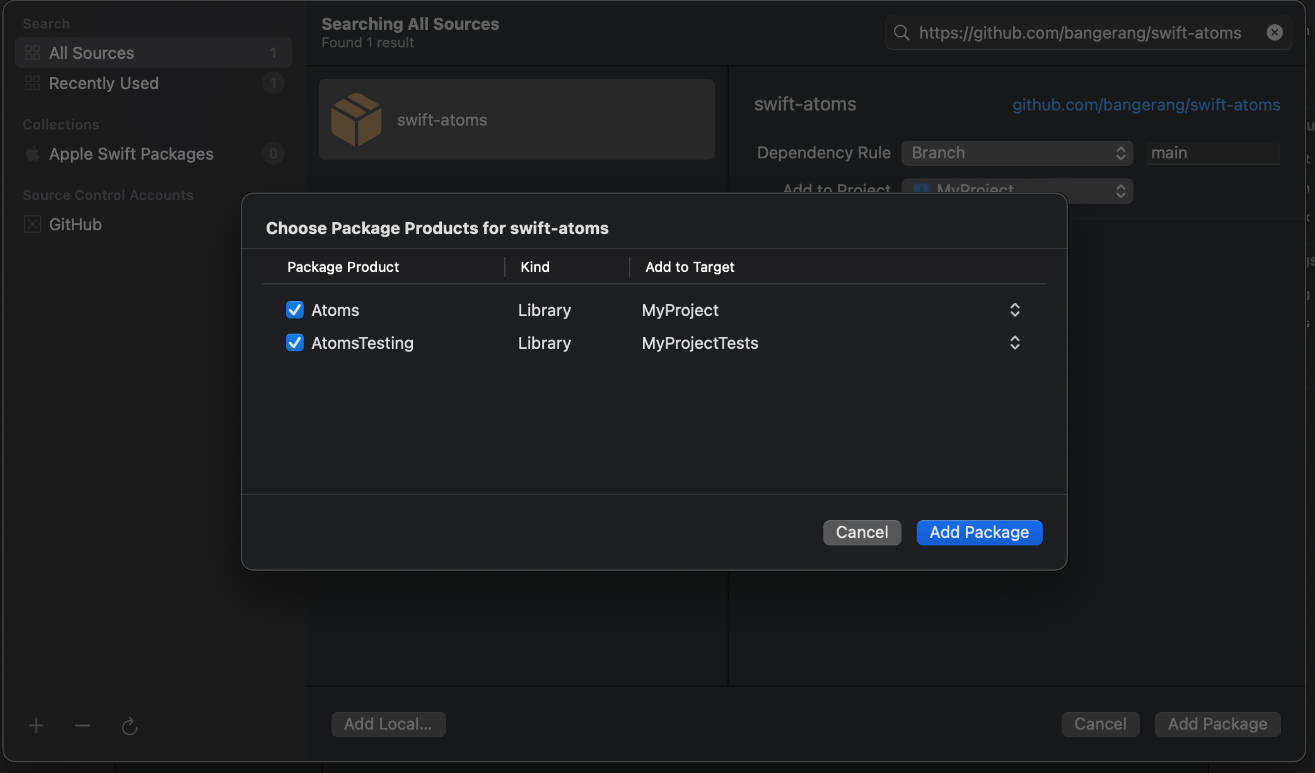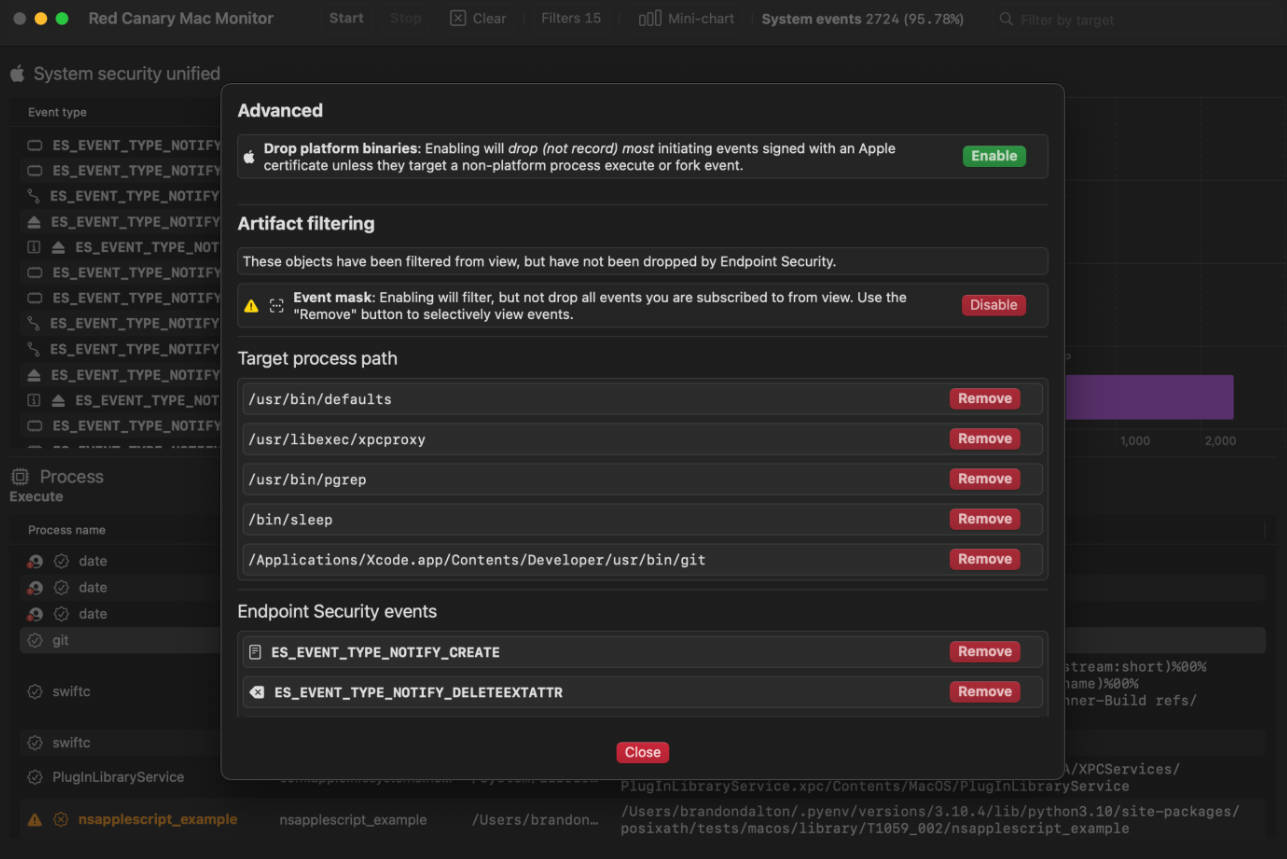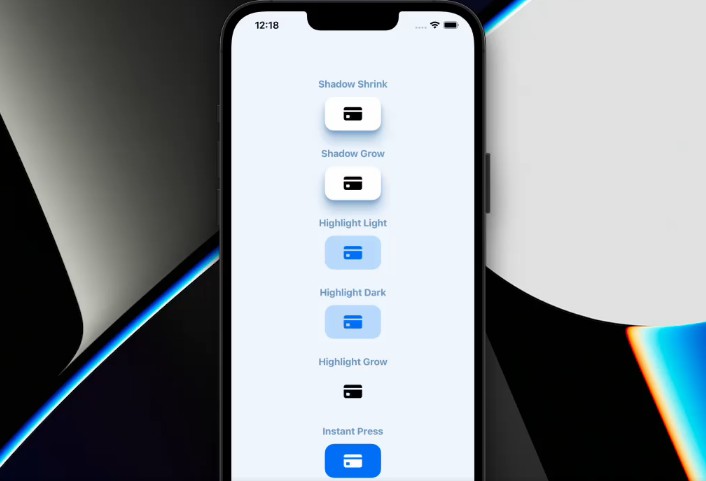Atoms
Atoms is a powerful and flexible atomic state management library for Swift, designed to create compact, independent global state components with seamless adaptability and composition.
// Create a text atom
let textAtom = Atom("")
// Create a derived atom that depends on textAtom.
// Atoms automatically update their state when any of their dependencies change.
let extractedNumbersAtom = DerivedAtom {
@UseAtomValue(textAtom) var text
return text.filter {
$0.isNumber
}
}
struct ContentView: View {
// Provide write access to the textAtom
@UseAtom(textAtom) var text
// Provide read-only access to the extractedNumbersAtom
@UseAtomValue(extractedNumbersAtom) var numbers
var body: some View {
VStack {
TextField("", text: $text)
Text("Extracted numbers: \(numbers)")
}
}
}
Motivation
While SwiftUI offers great built-in property wrappers for data-binding, it can become cumbersome and less efficient when building medium to large-scale production apps.
In traditional SwiftUI state management, sharing view data involves pushing it up to a common parent, which can lead to performance degradation and difficulties in code splitting. Additionally, using EnvironmentObjects to pass data down the view hierarchy can cause unnecessary re-rendering and performance issues in large applications.
Atoms was designed to overcome these challenges by offering a more efficient and flexible solution, while seamlessly integrating into the SwiftUI ecosystem. The library enables the creation of modular units for application data, which can be shared across the app as a single source of truth. This approach not only eliminates state-drilling but also ensures that only components with updated state are re-rendered.
Overview
Atoms comes with 9 different atom types that should cover most of your needs, such as dealing with asyncronousy.
let searchTextAtom = Atom("")
let apiAtom = Atom(...)
// Define a dogsAtom for fetching dogs based on the search text
let dogsAtom = AsyncAtom<[Dog]> {
@UseAtomValue(searchTextAtom, debounce: 0.3) var searchText
@UseAtomValue(apiAtom) var api
return try await api.searchDogs(searchText)
}
struct SearchDogsView: View {
@UseAtom(searchTextAtom) var searchText
@UseAtomValue(dogsAtom) var dogsState
var body: some View {
NavigationStack {
List {
switch dogsState {
case .loading:
ProgressView()
case .success(let dogs):
ForEach(dogs) {
Text($0.name)
}
case .failure(let error):
Text(error.localizedDescription)
Button("Try again") {
dogsAtom.reload()
}
}
}
.searchable(text: $searchText)
}
}
}
List of atoms
All atoms that accept a closure as their initial argument will update automatically when their dependencies change.
- Atom: Represents a state for a given value of type
T. - DerivedAtom: A read-only state derived from other atom states.
- AsyncAtom: Manages asynchronous operations that produce a value of type
Tor throw an error, with states represented asAsyncState<T>. - AsyncSequenceAtom: Manages the state of an asynchronous sequence producing values of type
Tor throwing an error, with states represented asAsyncState<T>. - GetSetAtom: Custom getter and setter for values of type
T. - ObservableObjectAtom: Represents a readable state for a given value of type
Tthat conforms toObservableObject. - PublisherAtom: Represents a readable state from a
Publisher, with states represented asAsyncState<T>. - PublishedAtom: Represents a readable state from a
Publishedproperty of typeT. - WillSetAtom: Stores values of type
Tand performs custom logic before updating the stored value.
Property Wrappers
- UseAtom: Provides read and write access to the atom’s value, and it’s reactive to changes.
- UseAtomValue: Provides read-only access to the atom’s value, and it’s reactive to changes.
- CaptureAtom: Captures the atom’s value and provides read and write access without being reactive to changes.
- CaptureAtomValue: Captures the atom’s value as a constant and provides read-only access without being reactive to changes.
- CaptureAtomPublisher: Provides an
AnyPublisher<T, Never>that emits the current value of the atom and any subsequent updates.
Dependency injection
Atoms supports testing and overriding values through dependency injection.
struct SearchDogsView_Previews: PreviewProvider {
static var previews: some View {
SearchDogsView()
.inject(dogsAtom) {
return .success([
.init(name: "Pluto"),
.init(name: "Lassie")
])
}
}
}
For testing, one can use the TestStore.
@MainActor
func testDogsSuccess() async throws {
let mock: [Dog] = [.init(name: "Pluto"), .init(name: "Lassie")]
try await TestStore { store in
store.inject(apiAtom) {
.init(searchDogs: { _ in
return mock
})
}
@CaptureAtomValue(dogsAtom) var dogsState: AsyncState<[Dog]>
@CaptureAtom(searchTextAtom) var searchText: String
searchText = "Foo"
try await expectEqual(dogsState, .success(mock))
}
}
Adaptive Memory Management
By default, atom values are stored in memory only while they are actively being used. However, it is still possible to keep certain values alive if needed by passing keepAlive: true when creating an atom.
Use with UIKit
Atoms can also be used with UIKit in addition to SwiftUI. You can use @CaptureAtomPublisher to subscribe to any atom value changes.
class ViewController: UIViewController {
@CaptureAtomPublisher(searchTextAtom) var searchTextPublisher
private let label = UILabel()
private var cancellable: AnyCancellable?
override func viewDidLoad() {
super.viewDidLoad()
view.addSubview(label)
cancellable = searchTextPublisher
.sink { [weak self] text in
self?.label.text = text
}
}
}
Namespacing
If the global namespace is not your thing, you can always create static let properties for scoping.
enum MyAtoms {
static let atom = Atom("")
static let derived = DerivedAtom {
@UseAtomValue(atom) var someValue
return someValue.filter {
$0.isNumber
}
}
}
Debugging
Atoms provides built-in debugging support to help you track state changes. Use the enableAtomLogging method on a View.
Text("Hello, World!")
.enableAtomLogging()
Or directly through the AtomStore.
AtomStore.shared.enableAtomLogging(debugScope: .include([counterAtom]))
Known Issues
Using property wrappers inline without a following keyword will lead to a compiler error. Hopefully this will be fixed in future Swift versions. The workaround for now is to either add a semicolon or explicitlly state the type.
let someAtom = DerivedAtom {
@UseAtomValue(someOtherAtom) var value: String
print(value)
return "Hello " + value
}
Examples
Documentation
Can be found here
Installation
Swift Package Manager
- Open your project in Xcode.
- Go to File > Add Packages….
- In the search bar, enter the URL of the Atoms repository:
https://github.com/bangerang/swift-atoms.git. - Click Add Package.
- Choose the appropriate package options and click Add Package again to confirm.
Testing installation
To make writing unit tests for Atoms even easier, the library comes bundled with AsyncExpectations, which is exported through the AtomsTesting library. To use AtomsTesting in your test target, make sure you add AtomsTesting to your test target.
While it’s recommended to use AtomsTesting for a more convenient testing experience with Atoms, it is not strictly required. You can still write unit tests for Atoms using XCTExpectations.
@MainActor
func testExample() async throws {
let expectation = expectation(description: #function)
await TestStore { store in
store.inject(textAtom) {
"Foo"
}
textAtom.onUpdate { newValue in
if newValue == "Foo" {
expectation.fulfill()
}
}
@CaptureAtomValue(textAtom) var text: String
}
wait(for: [expectation], timeout: 1)
}




